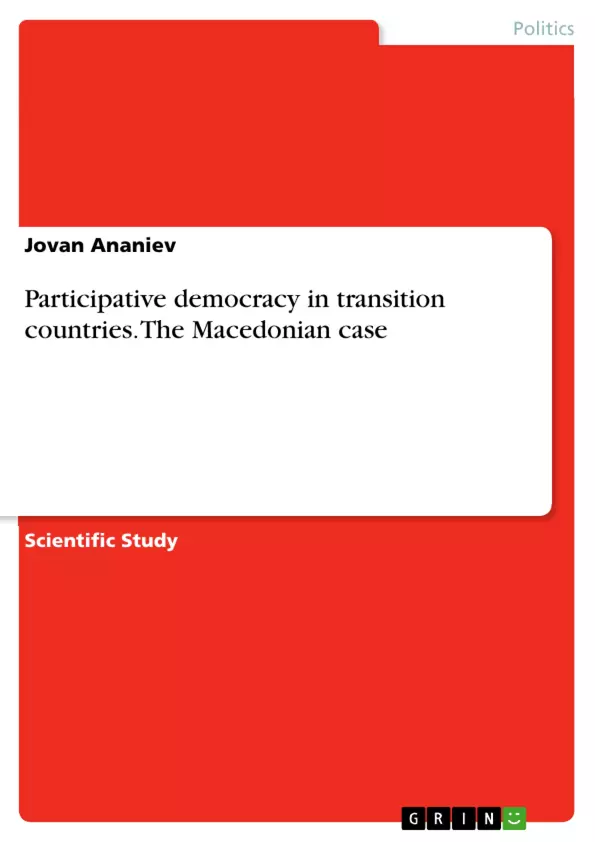Participative democracy is new phenomena in post communism countries, where were created specific model of democracy- combination of Western democratic institution and procedure and political culture developed on the base of communism and Turkish Imperium. Here participation is more declarative and stimulated by some NGO’s than tradition and usual political practice.
In this book are elaborated different forms of participation at national and local level, indirect and direct. The content is based on analysis of relevant legislation, presentation of former research results and conducted research by author.
Inhaltsverzeichnis (Table of Contents)
- PART I
- PARTICIPATIVE DEMOCRACY AT NATIONAL LEVEL
- Concepts
- Context
- Development and Features of the Party System
- Legal Framework to Ensure and Protect Civil and Political Rights
- Forms of direct democracy
- Who and How Participate
- Election process, political parties and inclusion
- The Assembly and civil participation
- Direct Democracy and Civic Inclusion
- Civil society and participation
- Rule of law and inclusion
- Concluding considerations for participative democracy at national level
- PARTICIPATIVE DEMOCRACY AT NATIONAL LEVEL
- PART II
- PARTICIPATIVE DEMOCRACY AT LOCAL LEVEL
- Introduction
- Mayor Municipal Council Relation
- Local Public Policy-Making
- Neighbourhood Units
- Civil Society and Local Government
- Public Information by Local Government Units
- Satisfaction of Citizens with the Decentralization Process and Services They Receive from the Municipality
- “Power Sharing” between Municipality Ethnic Communities for Greater Representation of Minority Communities (Minority Communities at the Local Level)
- Conclusions and recommendations for citizens participation at local level
- PARTICIPATIVE DEMOCRACY AT LOCAL LEVEL
Zielsetzung und Themenschwerpunkte (Objectives and Key Themes)
This book explores the development and practice of participatory democracy in the context of post-communist transition countries, using the specific case of Macedonia. The objective is to analyze the different forms of participation at national and local levels, considering both direct and indirect participation. The author examines the legal framework, political institutions, and civil society engagement in shaping participatory democracy in Macedonia. Key themes covered include: * The influence of legacy communist and Turkish political cultures on democratic development * The role of legal frameworks in ensuring civil and political rights * Different forms of direct democracy, such as referendums and citizen initiatives * The impact of civil society organizations on participation * The challenges and opportunities of decentralization and "power sharing" in fostering minority representation.Zusammenfassung der Kapitel (Chapter Summaries)
The first part of the book examines participatory democracy at the national level. Chapter 1 introduces key concepts and defines participatory democracy in the context of post-communist societies. Chapter 2 explores the historical and political context of participatory democracy in Macedonia, analyzing the development of the party system, the legal framework for civil and political rights, and forms of direct democracy. Chapter 3 delves into the different actors and mechanisms involved in participation, such as elections, political parties, the Assembly, civil society organizations, and the rule of law. Chapter 4 concludes with a discussion of the challenges and opportunities for participatory democracy at the national level in Macedonia. The second part of the book focuses on participatory democracy at the local level. Chapter 1 provides an introduction to the local context and key issues. Chapter 2 examines the relationship between the mayor and the municipal council, analyzing the distribution of power and decision-making processes. Chapter 3 explores the process of local public policy-making, including the role of different stakeholders. Chapter 4 discusses the role of neighborhood units in fostering local participation. Chapter 5 examines the relationship between civil society organizations and local government. Chapter 6 focuses on the role of local government units in providing public information. Chapter 7 assesses citizen satisfaction with decentralization and the services provided by municipalities. Chapter 8 analyzes the implementation of "power sharing" mechanisms for greater representation of minority communities at the local level. Chapter 9 concludes with a discussion of recommendations for improving citizen participation at the local level.Schlüsselwörter (Keywords)
This book focuses on participatory democracy, post-communist transition, Macedonia, civil society, decentralization, minority representation, legal framework, direct democracy, party system, and public policy-making.Frequently Asked Questions
What is participative democracy in the context of transition countries?
In post-communist transition countries like Macedonia, participative democracy is a hybrid model. It combines Western democratic institutions with a political culture still influenced by the legacy of communism and the Ottoman Empire.
How does the legal framework protect civil rights in Macedonia?
Macedonia has established a legal framework to ensure and protect civil and political rights, which is essential for citizen inclusion and the rule of law within a developing democratic system.
What are the forms of direct democracy available in Macedonia?
Direct democracy in Macedonia includes mechanisms such as referendums and citizen initiatives, though their use is often more declarative than a common political practice.
How does decentralization affect local participation?
Decentralization aims to bring decision-making closer to the citizens. It involves the relation between mayors and municipal councils, and the inclusion of neighborhood units in local public policy-making.
What is "power sharing" in Macedonian municipalities?
Power sharing refers to the mechanisms designed to ensure the representation of minority ethnic communities at the local level, promoting inclusion and stability within diverse municipalities.
- Quote paper
- Jovan Ananiev (Author), 2014, Participative democracy in transition countries. The Macedonian case, Munich, GRIN Verlag, https://www.grin.com/document/286601



